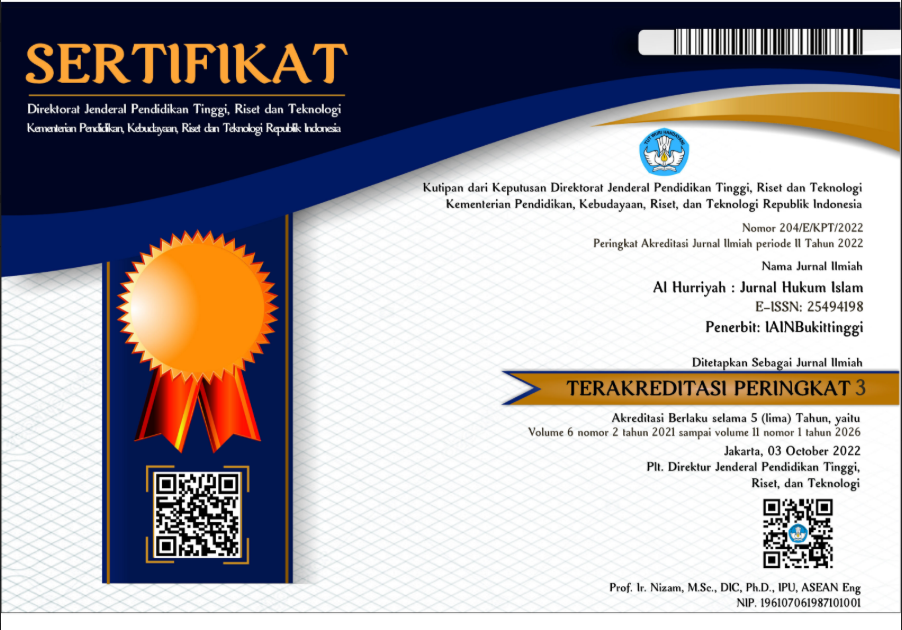EKSISTENSI WAKAF TUNAI DALAM TINJAUAN MASLAHAH MURSALAH
DOI:
https://doi.org/10.30983/alhurriyah.v4i1.817Abstract
Abstract
Cash waqf exists because of the demands of modern times that all things are easy, practical and simple. However, behind all the convenience provided by cash waqf still leaves a fundamental problem, namely the issue of the legal status of cash waqf. In this study, the researcher explained in detail the issue of the legal status of cash waqf from the perspective of maslahah mursalah. This study included the literature research category, and analyzing the data obtained, researchers used a prescriptive analysis approach. The data collection technique used is documentation technique. After an in-depth study obtained a conclusion that the terms of the term in the cash waqf have been considered legitimate, because the conditions are still good (Maslahah that is really realized in real field), maslahah ammah (Maslahah that is general is not only enjoyed by a certain group of people) , maslahah mulaiman bi syar'i (Maslahah which is in harmony and not contrary to the Shari'ah) has been fulfilled in cash waqf. So that the legal status of cash waqf is halal. Moreover, the requirements of al habsu ma'a baqo aynihi (holding items without removing the essence) also remain in cash waqf.
Keywords: Existence, Maslahah Mursalah, Cash Waqf.
 Â
Abstrak
Wakaf tunai lahir karena tuntutan zaman modern yang menghendaki segala sesuatu bersifat mudah, praktis dan simple. Namun, dibalik semau kemudahan yang diberikan wakaf tunai masih menyisakan persoalan mendasar, yakni persoalan legalitas hukumnya. Melalui kajian ini peneliti memaparkan secara mendetail persoalan status hukum wakaf tunai ditinjau dari perspektif maslahah mursalah. Penelitian ini termasuk kategori penelitan pustaka, sedangkan dalam menganalisi data yang diperoleh, peneliti mengunakan pendeketan analisis preskriptif.  Teknik pengumpulan data yang dipergunakan adalah teknik dokumentasi. Setelah dilakukan kajian mendalam diperoleh sebuah kesimpulan bahwa syarat berhujjah dalam wakaf tunai sudah diangap sah, karena syarat maslahah haqiqi (Maslahah yang benar benar terwujud secara real dilapangan), maslahah ammah (Maslahah yang bersifat umum bukan hanya dinikmati oleh seseorang atau kelompok orang tertentu saja), maslahah mulaiman bi syar’i (Maslahah yang selaras dan tidak bertentangan dengan syari’at) sudah terpenuhi pada wakaf tunai. Sehinga status hukum wakaf tunai adalah halal. Apalagi persyaratan al habsu ma’a baqo aynihi (menahan barang dengan tidak menghilangkan dzatnya) juga tetap ada dalam wakaf tunai.
Kata kunci: Eksistensi, Maslahah Mursalah, Wakaf Tunai.
Â
References
Al-NasÄ’ī, AbÅ« ‘Abdu al-RaḥmÄn Aḥmad bin Shu’ayb bin ‘AlÄ«, Sunan al-NasÄ’ī, Juz. VI, (DÄr al-Fikr: Beirut, 1995)
Amudi, Imam, Al-Ahkam li Amudi, Maktabah Syamilah Versi 7 G & 14 G, Jilid 4
Al-ZuhaylÄ«, Wahbah, al-Waá¹£ÄyÄ wa al-Waqf fÄ« al-Fiqh al-IslÄmÄ«, (Beirut: DÄr al-Fikr al-MuÊ»Äá¹£ir, 1998)
Al-Zuhayli, Wahbah, al-Fiqh al-IslÄmÄ« wa Adillatuhu, Juz X,(Damaskus: DÄr al-Fikr, 1985)
Badr, Abdul Muhsin bin Hamdul Ibad, Al-Hastu bi it-Tiba’i as-Sunah wa Tahżiru min Bid’i wa Bayani khoá¹oriha, Maktabah Syamilah Versi 7 G & 14 G, Jilid 1
Baijuri, Hasyiyah al-Baijuri, Juz II, (Bairut : Dar al-Fikr, tt)
Bisri, Adib dan Munawir, Kamus al-Bisri, cet. ke-1, (Surabaya: Pustaka Progesif, 1999)
Bisri, Cik Hasan, Model Penelitian Fiqh, cet. ke-1, (Bogor: Kencana, 2003)
Bisri, Cik Hasan, Pilar-Pilar Penelitian Hukum Islam dan Pranata Sosial, cet. ke-1, (Jakarta: PT. Raja Grafindo Persada, 2004).
Fatwa Majelis Ulama Indonesia (MUI) tertanggal 26 April 2002
Jumantoro, Totok dan Samsul Munir Amin, Kamus Ushul Fiqh, cet. ke-1, (Penerbit Amzah, 2005)
Kasiram, Moh., Metodologi Penelitian Kualitatif-Kuantitatif, cet. ke-1, (Malang: UIN-Maliki Press, 2008)
Khalaf, Abdul Wahab, Ushul Fiqh, (Kairo: Darul ‘ilmi, 1987)
KhÄlid bin SaÊ»ad bin Muammad al-Muqrin, al-Usus al-Naariyah LiliqtiÄd al-IslÄmÄ«, (Riyadh: t.p., 2003)
Menteri perwakofan dan urusan keislaman Kuwait, Al-Mausu’ah al-Fiqhiyah Quwait, Maktabah Syamilah Versi 7 G & 14 G
Menteri perwakofan dan urusan keislaman Kuwait, Al-Mausu’ah al-Fiqhiyah Quwait, Maktabah Syamilah Versi 7 G & 14 G
Mukhtar, Shohibul Rudul, Roddul Mukhtar, Maktabah Syamilah 14 G
Nawawi, Ar-Raudhah, Juz IV, (Bairut : Dar al-Kutub al-Ilmiah, tt)
Rozi, Imam, al-Mahsul, Maktabah Syamilah Versi 7 G & 14 G
Subki, Imam Tajuddin, Matan Jam'ul Jawami', Jilid 1, (Libanon : Darul Fikr, 2003).
Syarbasyi, Ahmad, Mu’jam Iqtishad al-Islamy, (Mesir: Dar Jayl, 1981)
Syarbini, Mughni al-Muhtaj, Juz II, (Kairo : Mushthafa Halabi, tt)
Syaukani, Imam, Irsyad al-Fuhul, Maktabah Syamilah Versi 7 G & 14 G
Syirbini, Syamsuddin Muhammad bin Ahmad, Mugnil Muhtaj, Maktabah Syamilah 14 G
Zahro, Muhammad Abu, Ushul Fiqh, (Demaskus: Darul Fikr, 1985)
Downloads
Published
How to Cite
Issue
Section
Citation Check
License
Authors who publish with this journal agree to the following terms:
- Authors retain copyright and grant the journal right of first publication with the work simultaneously licensed under a Creative Commons Attribution-ShareAlike 4.0 International License that allows others to share the work with an acknowledgment of the work's authorship and initial publication in this journal.
- Authors are able to enter into separate, additional contractual arrangements for the non-exclusive distribution of the journal's published version of the work (e.g., post it to an institutional repository or publish it in a book), with an acknowledgment of its initial publication in this journal.
- Authors are permitted and encouraged to post their work online (e.g., in institutional repositories or on their website) prior to and during the submission process, as it can lead to productive exchanges, as well as earlier and greater citation of published work (See The Effect of Open Access).





